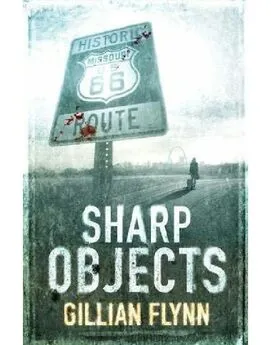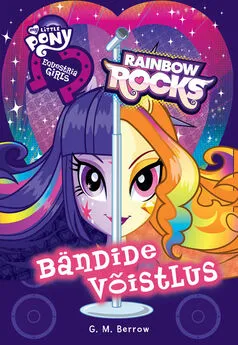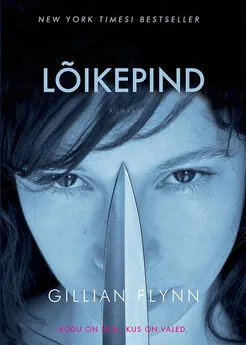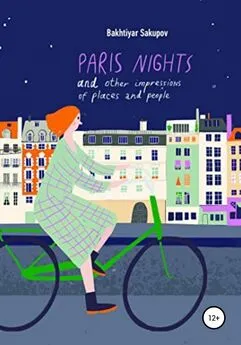Gillian Flynn - Dark Places
- Название:Dark Places
- Автор:
- Жанр:
- Издательство:неизвестно
- Год:неизвестен
- ISBN:нет данных
- Рейтинг:
- Избранное:Добавить в избранное
-
Отзывы:
-
Ваша оценка:
Gillian Flynn - Dark Places краткое содержание
Dark Places - читать онлайн бесплатно полную версию (весь текст целиком)
Интервал:
Закладка:
“Some strange stuff,” Diane said, patting her back. “Let’s get you home.”
“I don’t want to go home. I need to find my son.”
The word son started her weeping again and she let it rip: gulping sobs and thoughts jabbing her like needles. He’d need a lawyer. They didn’t have money for a lawyer. He’d get some bored county guy appointed to him. They’d lose. He’d go to jail. What would she tell the girls? How long did someone go away for something like that? Five years? Ten? She could see a big prison parking lot, the gates opening, and her Ben gingerly walking out, twenty-five years old, frightened of the open space, eyes narrowed against the light. He comes near her, her arms open, and he spits on her for not saving him. How do you live with not being able to save your son? Could she send him away, on the run, fugitive? How much money could she even give him? In December, numb from exhaustion, she’d sold her dad’s army 45 Auto to Linda Boyler. She could picture Dave Boyler, who she’d never liked, opening it up Christmas morning, this gun he didn’t earn. So Patty, right now, had almost three hundred bucks squirreled away in the house. It was all owed to others, she’d planned on making her first-of-the-month rounds later today, but that wouldn’t happen now—plus $300 would only keep Ben going a few months.
“Ben will come home when he finishes blowing off steam,” Diane reasoned. “How far can he get on a bike in January?”
“What if they find him first?”
“Sweetheart, there’s no mob after him. You heard, the Muehler boys didn’t even know about the … accusation. They were talking about other bullshit rumors. We need to talk to Ben to straighten this out, but for all we know he could be home right now.”
“Who’s the family that’s saying he did this?”
“No one said.”
“You can find out though. They can’t just say things like that and expect us to lie down and take it, right? You can find out. We have a right to know who’s saying this. Ben has a right to confront his accuser. I have a right.”
“Fine, let’s go back to the house, check in on the girls, and I’ll make some calls. Now will you let me drive?”
THEY WALKED INTOpure din. Michelle was trying to fry salami strips on the skillet, screaming at Debby to go away. Libby had a splatter of bright pink burns up one arm and a cheek where the grease had hit her, and was sitting on the floor, mouth wide, crying the way Patty had just been crying in the car: as if there was absolutely no hope, and even if there was, she wasn’t up to the challenge.
Patty and Diane moved like they were choreographed, one of those German clocks with the fancy men and women dancing in and out. Diane strode to the kitchen in three big steps and yanked Michelle away from the stove, dragging her by the one arm, doll-like, to the living room, depositing her on the sofa with a swat on her tush. Patty crisscrossed them, swooped up Libby, who monkey-wrapped herself around her mother and continued crying into her neck.
Patty turned on Michelle, who was loosing fat silent tears. “I told you: You may only use the stove to heat soup. You could have set this whole place on fire.”
Michelle glanced around the shabby kitchen and living room as if wondering whether that would be a loss.
“We were hungry,” Michelle mumbled. “You’ve been gone forever.”
“And that means you need a fried salami sandwich your mom told you not to make?” snapped Diane, finishing up the frying, slapping the meat on a plate. “She needs you to be good girls right now.”
“She always needs us to be good girls,” Debby mumbled. She was nuzzling a pink stuffed panda that Ben had won years ago at the Cloud County fair. He’d knocked down a bunch of milk bottles, just as his pre-teen muscles were coming in. The girls had celebrated as if he’d won a Medal of Honor. The Days never won anything. They always said that, marveling, whenever they had a tiny piece of good luck: We never win anything! It was the family motto.
“And is it really so hard to be good?” Diane gave Debby a soft chuck under her chin and Debby lowered her gaze even more as she started to smile.
“I guess not.”
Diane said she’d make the calls, grabbing the kitchen phone and pulling it all the way down the hall as far as it could go. As she walked away, she told Patty to feed her dang children—the words riling Patty, as if she was so negligent she often forgot meals. Make tomato soup from ketchup and milk from a powder, yes. Toast some stale bread, add a squirt of mustard and call it a sandwich, yes. On the worst days, yes. But she never forgot. The kids were on the free-lunch program at school, so they always got something there at least. Even as she thought this, she felt worse. Because Patty went to the same school as a kid, and she never had to do Half-Lunch or Free-Lunch, and now her stomach knotted as she remembered the Free-Lunch kids and her patronizing smiles toward them as they presented their dog-eared cards, and the steamy cafeteria ladies would call it out: Free Lunch! And the boy next to her, buzz-haired and confident, would whisper inanely: There’s no such thing as a free lunch . And she’d feel sorry for the kids, but not in a way that made her want to help, just in a way that made her not want to look at them anymore.
Libby was still heaving and crying in her arms; Patty’s neck was sweaty from the girl’s hot breaths. After twice asking Libby to look at her, the girl finally blinked and turned her face up to her mother’s.
“I, got, buuurrrned.” Then she started crying again.
“Baby, baby, it’s just a few ouchies. It won’t be permanent, is that what you’re worried about? They’re just some little pink ouchies— you won’t even remember next week.”
“Something bad’s gonna happen!”
Libby was her worrier; she came out of the womb wary and stayed that way. She was the nightmare girl, the fretter. She was an outta-nowhere pregnancy; neither Patty nor Runner were happy. They didn’t even bother with a baby shower; their families were so sick of them procreating that the entire pregnancy was an embarrassment. Libby must have marinated in anxious stomach acid for nine months, soaking up all that worry. Potty training her was surreal— she screamed when she saw what came out of her, ran away naked and frantic. Dropping her off at school had always been an act of utter abandonment, her daughter with the giant, wet eyes, face pressed against the glass, as a kindergarten teacher restrained her. This past summer she refused to eat for a week, turned white and haunted, then finally (finally, finally) revealed to Patty a pod of warts that had sprouted on one knee. Eyes down, in slow sentences that Patty extracted from her over the course of an hour, Libby explained that she thought the warts might be like poison ivy, that they’d eventually cover her and (sob!) no one would be able to see her face anymore. And when Patty had asked why, why in the world hadn’t Libby told her these worries before, Libby just looked at her like she was crazy.
Whenever possible, Libby prophesized doom. Patty knew that, but the words still made her clench. Something bad had already happened. But it would get worse.
She sat with Libby on the couch, smoothing her hair, patting her back. Debby and Michelle hovered near, fetching tissues for Libby and fussing over her the way they should have done a good hour ago. Debby tried to make the panda pretend-talk to Libby, telling her she was OK, but Libby shoved it away and turned her head. Michelle asked if she could cook everyone soup. They ate soup all through the winter, Patty keeping giant vats of it in the freezer-locker in the garage. They usually ran out right around the end of February. February was the worst month.
Michelle was dumping a big frozen square of beef and vegetables into a stew pot, cracking off the ice, ignoring the plate of salami, when Diane returned with her mouth tugged into a grimace. She lit a cigarette— trust me, I need it —and sat down on the sofa, her weight bumping up Patty and Libby like a seesaw. She sent the girls into the kitchen with Michelle, the kids not saying anything, obedient in their nervousness.
“OK. So it’s this family named Cates that started it—they live halfway between here and Salina, send their kid to Kinnakee because the public school’s not finished in their suburb. So it started because Ben was doing after-school volunteering with the Cates girl. Did you know he was volunteering?”
Patty shook her head.
“Volunteering?”
Diane pushed her lips out: didn’t jive with her either.
“Well, for whatever reason, he was volunteering with these young kids in the elementary school, and this girl’s parents say something wrong went on between them. And so do some others. The Hinkels, the Putches, and the Cahills.”
“What?”
“They’re all comparing notes, they’ve all talked to the school. From what I hear, the police are now involved, and you should expect someone, a cop, to come by today to talk to you and Ben. It’s reached that stage. Not everyone at school knows—we’re lucky this happened on Christmas break—but I guess after today that won’t be the case. I guess any kid who Ben helped after school, the school is talking to the parents. So, like, ten families.”
“What should I do?” Patty put her head between her knees. She felt laughter in her stomach, it was all so ludicrous. I wonder if I’m having a breakdown, she thought. Maybe I could have a breakdown and then I won’t have to talk to anyone . A safe white room, and Patty being ushered like a child from breakfast to lunch to dinner, maneuvered by people with gentle whispers, Patty shuffling like someone who’s dying.
“I guess everyone’s over at the Cates place, talking right now,” Diane said. “I got the address.”
Patty just stared.
“I think we should go over there,” Diane said.
“Go over there? I thought you said someone would come here.”
“The phone’s been ringing off the hook,” Michelle said, Michelle who’d been in the kitchen and shouldn’t have heard any of this.
Patty and Diane both turned to the phone, waiting for it to go off.
“Well, why didn’t you answer it like we asked, Michelle?” Diane said.
Michelle shrugged. “I forgot if we were supposed to or not.”
“Maybe we should wait here,” Patty said.
“Patty, those families are over there talking … shit about your son. Now who knows what kernel of truth may be in there or not, but don’t you want to go speak for him? Don’t you want to hear what they’re saying, make them say it to our face?”
No, she didn’t. She wanted the stories to go away, nice and quiet, creep backward into oblivion. She didn’t want to hear what people in her town—Maggie Hinkel went to high school with her, for Pete’s sake—were saying about Ben. And she was afraid she’d crumble with all those furious faces on her. She’d weep, beg for forgiveness. Already, all she wanted was forgiveness, and they hadn’t even done anything wrong.
“Let me put on some better clothes.”
SHE FOUND Asweater without rips in the armpits and a pair of khaki slacks. She ran a comb through her hair, and exchanged her gold studs for a pair of imitation pearl earrings and matching necklace. You really couldn’t tell they were fake, they even felt heavy.
As she and Diane went toward the front door—further admonishments about using the stove, a request to turn off the TV and do chores at some point—Libby began wailing again, running toward them with her arms flapping. Michelle crossed her arms over her stained sweatshirt and stomped a foot.
Читать дальшеИнтервал:
Закладка:










